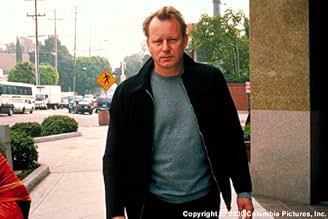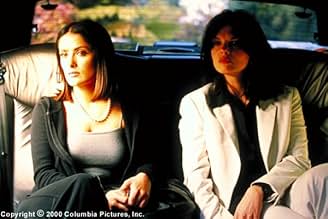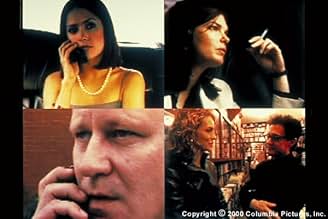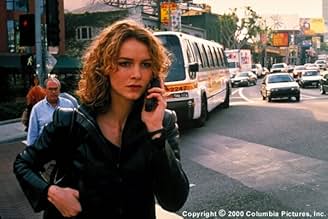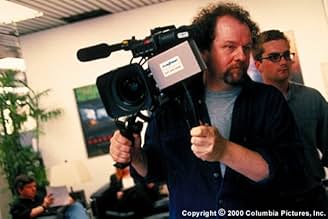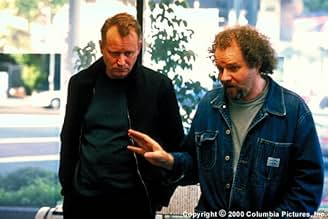AVALIAÇÃO DA IMDb
6,0/10
7,3 mil
SUA AVALIAÇÃO
Quatro quadros de ação simultânea que seguem alternadamente uma apaixonada amante lésbica enquanto ela fica obcecada com os flertes de sua parceira e os acontecimentos tensos de uma produtor... Ler tudoQuatro quadros de ação simultânea que seguem alternadamente uma apaixonada amante lésbica enquanto ela fica obcecada com os flertes de sua parceira e os acontecimentos tensos de uma produtora de filmes de Hollywood.Quatro quadros de ação simultânea que seguem alternadamente uma apaixonada amante lésbica enquanto ela fica obcecada com os flertes de sua parceira e os acontecimentos tensos de uma produtora de filmes de Hollywood.
- Prêmios
- 2 indicações no total
Avaliações em destaque
10neil_mc
I am pretty sure that I will not see a more jaw-dropping piece of film-making for quite some time. To put the complexity of filming 4 continuous takes simultaneously and in full co-ordination into any perspective, is extremely difficult. And then to have such a dramatic climax at the end of 93 improvised minutes is pretty mind-blowing.
I'm sure plenty of people will scream "pretentious crap" - as the girl suggests in her meeting speech - but the innovative brilliance of this film should be applauded above everything else. For example, little things like how the camera is focused on Skarsgard in the meeting while his wife is having it away with another woman. And then bigger things such as each screen simultaneously focusing in close-up on their characters eyes. Unbelievable.
I'm sure this isn't everybody's cup of tea - some people just don't appreciate the concept of doing something unique and risky. Some people even go as far as criticising Mike Figgis for attempting this - when in truth, this experiment was never likely to reach the masses, so any accusation of arrogance/pretension are pathetic.
As for the story and acting, I have a sneaky suspicion that maybe the sound was turned down on certain screens in post-production when actor's were fumbling or struggling for dialogue, I also thought the sound should have been muted from the other 3 screens while we were focused on one - because at times we get mumbling from all 4 at once, which doesn't work. But none of this detracts from a truly great achievement from all involved - for actors to go 93 minutes undisturbed is very impressive.
A perfectly constructed and co-ordinated film, I am in absolute awe. 10/10
I'm sure plenty of people will scream "pretentious crap" - as the girl suggests in her meeting speech - but the innovative brilliance of this film should be applauded above everything else. For example, little things like how the camera is focused on Skarsgard in the meeting while his wife is having it away with another woman. And then bigger things such as each screen simultaneously focusing in close-up on their characters eyes. Unbelievable.
I'm sure this isn't everybody's cup of tea - some people just don't appreciate the concept of doing something unique and risky. Some people even go as far as criticising Mike Figgis for attempting this - when in truth, this experiment was never likely to reach the masses, so any accusation of arrogance/pretension are pathetic.
As for the story and acting, I have a sneaky suspicion that maybe the sound was turned down on certain screens in post-production when actor's were fumbling or struggling for dialogue, I also thought the sound should have been muted from the other 3 screens while we were focused on one - because at times we get mumbling from all 4 at once, which doesn't work. But none of this detracts from a truly great achievement from all involved - for actors to go 93 minutes undisturbed is very impressive.
A perfectly constructed and co-ordinated film, I am in absolute awe. 10/10
Mike Figgis does a Robert Altman. Except, instead of creating a large narrative of interconnecting plot strands, he puts them all on four split screens. Is this therefore more subversive than Altman? I don't think so - Altman's method is an attack on Hollywood linearity, on conventional methods of 'connection'; his characters exist is the same space but are emotionally etc. miles apart. The characters in 'Short Cuts', like the city of L.A. itself, are a mass without a centre. Figgis, for all the supposed diffusion of his visual strands, actually reunites, glues together Altman's ruptures. In this way it might seem a more optimistic kind of film. It isn't.
'timecode' is being touted as a revolution in cinema, a new way of watching films. Instead of watching one screen and being led by a director, we are given four, and asked to make our choices. I was surprised at how panicked I was at this in the first 20 minutes, darting between scenes, wondering which one I should follow. This forced me out of the film much more disturbingly than anything by Fassbinder or Godard. But this alienation is deceptive. Firstly we are not really bombarded by four narratives - put 'pierrot le fou', 'diary of a country priest', 'vampyr' and 'branded to kill' on four screens, then you'd be confused. Figgis leads you all the way, gives you an illusion of choice, but rarely fulfils it. The focus is on one screen at a time - either the soundtrack is turned up loudest, the plot is more interesting, whatever. For long periods of time, you can safely ignore other scenes because there is nothing going on - for about 20 minutes, for example, Lauren sits in a limousine listening to a bug planted on Rose; this leaves us free to watch another screen and see what she's listening to. Other scenes are merely tedious - eg Emma droning to her shrink (a nod to Godard's 'week end', that famous end of cinema?) - so that you gladly look elsewhere. It is possible to listen to one scene, and flit around at the others to catch up on what's going on.
What I'm saying is, 'timecode' is not a difficult experience - after the initial adjustment, you watch the film as you would any other, especially as all the stories converge and are really only one story. Even at the beginning, the feeling is less one of Brechtian alienation than akin to being a security guard faced with a grid of screens - you rarely think about the physical processes of film or performance, as you would in a Dogme or Godard film.
So if 'timecode' is less revolutionary than it seems, that doesn't mean it isn't a brilliant film, a real purse in a pig's ear of a year (or whatever the expression is). One reason for this is the four-screen structure: I would have to watch it a few more times, but I was very conscious of the orchestration of the screens, the way compositions, or camera movements, or close-ups etc., in one screen were echoed, reflected, distorted in the others - a true understanding of this miraculous formal apparatus would, I think, give us the heart of the film, and bely the improvised nature of the content. Figgis is also a musician - he co-composed the score - and the movement here, its fugues and variations are truly virtuosic, almost worthy of my earlier Altman comparison.
But the content is great fun too. At first I was disappointed at the self-absorbed drabness of the material, the idea that we shouldn't be made to work too hard because we've enough to deal with the four screens. And, it is true, that the stories rarely transcend cliche. But, such is the enthusiasm of the performers (people like Salma Hayek obviously relishing slightly more useful roles than the bilge they're usually stuck in); the precision of the structure; the mixture of comedy and pathos, and the way the style facilitates both, that you're convinced you're watching a masterpiece. Quentin's massaging and Ana's pitch are two of the funniest things I've seen in ages, while Stellan Skarsgard's rich performance stands out all the more for its brittle surroundings.
'timecode' is being touted as a revolution in cinema, a new way of watching films. Instead of watching one screen and being led by a director, we are given four, and asked to make our choices. I was surprised at how panicked I was at this in the first 20 minutes, darting between scenes, wondering which one I should follow. This forced me out of the film much more disturbingly than anything by Fassbinder or Godard. But this alienation is deceptive. Firstly we are not really bombarded by four narratives - put 'pierrot le fou', 'diary of a country priest', 'vampyr' and 'branded to kill' on four screens, then you'd be confused. Figgis leads you all the way, gives you an illusion of choice, but rarely fulfils it. The focus is on one screen at a time - either the soundtrack is turned up loudest, the plot is more interesting, whatever. For long periods of time, you can safely ignore other scenes because there is nothing going on - for about 20 minutes, for example, Lauren sits in a limousine listening to a bug planted on Rose; this leaves us free to watch another screen and see what she's listening to. Other scenes are merely tedious - eg Emma droning to her shrink (a nod to Godard's 'week end', that famous end of cinema?) - so that you gladly look elsewhere. It is possible to listen to one scene, and flit around at the others to catch up on what's going on.
What I'm saying is, 'timecode' is not a difficult experience - after the initial adjustment, you watch the film as you would any other, especially as all the stories converge and are really only one story. Even at the beginning, the feeling is less one of Brechtian alienation than akin to being a security guard faced with a grid of screens - you rarely think about the physical processes of film or performance, as you would in a Dogme or Godard film.
So if 'timecode' is less revolutionary than it seems, that doesn't mean it isn't a brilliant film, a real purse in a pig's ear of a year (or whatever the expression is). One reason for this is the four-screen structure: I would have to watch it a few more times, but I was very conscious of the orchestration of the screens, the way compositions, or camera movements, or close-ups etc., in one screen were echoed, reflected, distorted in the others - a true understanding of this miraculous formal apparatus would, I think, give us the heart of the film, and bely the improvised nature of the content. Figgis is also a musician - he co-composed the score - and the movement here, its fugues and variations are truly virtuosic, almost worthy of my earlier Altman comparison.
But the content is great fun too. At first I was disappointed at the self-absorbed drabness of the material, the idea that we shouldn't be made to work too hard because we've enough to deal with the four screens. And, it is true, that the stories rarely transcend cliche. But, such is the enthusiasm of the performers (people like Salma Hayek obviously relishing slightly more useful roles than the bilge they're usually stuck in); the precision of the structure; the mixture of comedy and pathos, and the way the style facilitates both, that you're convinced you're watching a masterpiece. Quentin's massaging and Ana's pitch are two of the funniest things I've seen in ages, while Stellan Skarsgard's rich performance stands out all the more for its brittle surroundings.
`Time Code' is the first film to use the method of split-screen quadrants where four stories, done in real time, unfold onto the screen. And an audacious, refined experience it is. This technique was going to be hit-and-miss. With four stories, you can only watch one at a time, and by focusing on one you may miss some key elements in another story. All are loosely intertwined, some more interesting than others. There is no digital grading/ authentication done to the images, so the film looks perfectly realistic.
The sound is emphasised on one of the screens at a time, though sometimes it is hard to differentiate which one. While the stories are perfectly watchable, they aren't invigorating or compelling and are only worthy of a passive attention. The narrative is strong and continued in a series of earthquakes that would rank about a 4 on the Richter scale. This is the first occasion in which I can honestly say that characters get plenty of screen-time (in fact they are in every scene), but barely develop.
Case in point is Saffron Burrows whose character is barely ever emphasised upon and we are offered pretty much no guidance as to what's going on in her story. Jeanne Tripplehorn's part is pretty much wasted as 95% of her screen-time is wasted on her simply sitting in her limo, barely even talking. She shows her true colours in the end, but these revelations are made too late in the game to be indispensable. In the third quadrant, there are many big names such as Holly Hunter, Salma Hayek, Julian Sands (`Leaving Las Vegas', `Naked Lunch), Stellan Skargaard (`The Glass House') and Kyle McLachlan. There are solid, subtle performances all round from the ensemble, but the characters themselves are poorly written.
Still though, Mike Figgis' avant-garde risque direction is suitably original and proves to be a talent to look out for in the future. While it is an accurate portrayal of high-class Los Angeles, there is an over-emphasis on drug use and lesbianism that compromises the originality of it all. `Time Code' must have been a step away from `impossible' to film. As there were no edits and stories took place in real time as they interwove, there's no telling how many takes they had to execute.
If one actor were to forget their line after about 90 minutes, everything would have to start all over again from the top. It's a surprise that the film even finished shooting, but they pulled it off and that deserves admiration. The movie ends on a sourly climactic moment that may leave a bad taste, but seems perfectly in keeping with Figgis' bravura tone. If you haven't yet seen `Time Code' it's best you know the gist of the plot and sub-plots before watching it, or you'll be absolutely lost from start to finish.
One of the most groundbreaking, though not spectacular, movies in recent year, `Time Code' proves to be an intelligent, admirable effort. While this experiment is unlikely to be attempted again, this is the first and undoubtedly the best of its kind. It definitely should have received attention on Oscar night. Curiously enough, the sound effects editing is the film's strongest point. My IMDb rating: 7.4/10.
The sound is emphasised on one of the screens at a time, though sometimes it is hard to differentiate which one. While the stories are perfectly watchable, they aren't invigorating or compelling and are only worthy of a passive attention. The narrative is strong and continued in a series of earthquakes that would rank about a 4 on the Richter scale. This is the first occasion in which I can honestly say that characters get plenty of screen-time (in fact they are in every scene), but barely develop.
Case in point is Saffron Burrows whose character is barely ever emphasised upon and we are offered pretty much no guidance as to what's going on in her story. Jeanne Tripplehorn's part is pretty much wasted as 95% of her screen-time is wasted on her simply sitting in her limo, barely even talking. She shows her true colours in the end, but these revelations are made too late in the game to be indispensable. In the third quadrant, there are many big names such as Holly Hunter, Salma Hayek, Julian Sands (`Leaving Las Vegas', `Naked Lunch), Stellan Skargaard (`The Glass House') and Kyle McLachlan. There are solid, subtle performances all round from the ensemble, but the characters themselves are poorly written.
Still though, Mike Figgis' avant-garde risque direction is suitably original and proves to be a talent to look out for in the future. While it is an accurate portrayal of high-class Los Angeles, there is an over-emphasis on drug use and lesbianism that compromises the originality of it all. `Time Code' must have been a step away from `impossible' to film. As there were no edits and stories took place in real time as they interwove, there's no telling how many takes they had to execute.
If one actor were to forget their line after about 90 minutes, everything would have to start all over again from the top. It's a surprise that the film even finished shooting, but they pulled it off and that deserves admiration. The movie ends on a sourly climactic moment that may leave a bad taste, but seems perfectly in keeping with Figgis' bravura tone. If you haven't yet seen `Time Code' it's best you know the gist of the plot and sub-plots before watching it, or you'll be absolutely lost from start to finish.
One of the most groundbreaking, though not spectacular, movies in recent year, `Time Code' proves to be an intelligent, admirable effort. While this experiment is unlikely to be attempted again, this is the first and undoubtedly the best of its kind. It definitely should have received attention on Oscar night. Curiously enough, the sound effects editing is the film's strongest point. My IMDb rating: 7.4/10.
"Timecode" is not conventional filmmaking, which is the whole beauty of it. This is a totally improvised piece of cinema, shot on a hand-held camera for 90 minutes straight--not a single cut--and shot in real-time. Every word of dialogue is improvised, the only thing written is the story (also by Mike Figgis). The way it turned out is quite impressive. Of course, the process gets tiresome and repetitive at times, but overall it's a pretty fascinating work that will probably be better appreciated by the more open-minded moviegoer--as opposed to mainstream viewers who will probably view this as just plain weird.
I was really impressed by the talented cast filled with great actors who simply went through the WHOLE ENTIRE process without once messing up. If you watch all these behind-the-scenes specials with actors stumbling line-after-line, doing take-after-take, until they finally get it right the 100th time--it's astounding to see that the whole cast was able to pull this off without a scratch. Even with such talented actors like Stellan Sarsgard, Holly Hunter, Salma Hayek, Jeanne Tripplehorn, etc., I have to commend them especially for taking part in this risky project. This movie not only showcases their knacks for acting, but also their potential to try something new, innovative and quite difficult--after all, taking risks is one of the main elements in becoming a good actor.
This type of format does--at points--feel like a theatrical version of a "Big Brother" episode, but Figgis wrote a story with as much intriguing elements as he can possibly fit into a film of this scope. After all, this is supposed a day-in-the-life type of story and you don't want to be too far-fetched. So he tries to generate as much suspense and intrigue (involving the many smutty attributes of the stereotypical white-collar LA resident) as he possibly could. There are subplots involving drug abuse, alcohol abuse, homosexuality, philandering, jealousy and of course the biggest theme of all...Sex! Naturally, my interest did sometimes drift, but the material compelled me enough to be interested for the majority of the running time. I've never been a fan of those corny reality shows. Quite frankly, I think the kind of reality displayed on those programs is very dull. "Timecode" transcends the dullness of the reality shows and, in a way, the "Blair Witch Project" (which is another reality-based film shot entirely on a hand-held camera, but executed very poorly). The material is engaging to a degree, the actors perform it very well and everything is down-to-earth to preserve its sense of realism. My only criticisms lie in the "earthquake effects." Those looked totally cheesy, created entirely by camera tricks and actors pretending to be shaken up. In one of the closing scenes, Jeanne Tripplehorn is clinging on to a nearby bannister while you can see cars in the background moving along smoothly. He could've done without that pretentious trick.
I'm not saying this a great film, but it is one I'll remember for its unique sense of style and I will always remember Mike Figgis for coming up with this innovative method. If you're tired of mainstream cinema and feel anxious to see something new and exciting--this is a film I would recommend.
My score: 7 (out of 10)
I was really impressed by the talented cast filled with great actors who simply went through the WHOLE ENTIRE process without once messing up. If you watch all these behind-the-scenes specials with actors stumbling line-after-line, doing take-after-take, until they finally get it right the 100th time--it's astounding to see that the whole cast was able to pull this off without a scratch. Even with such talented actors like Stellan Sarsgard, Holly Hunter, Salma Hayek, Jeanne Tripplehorn, etc., I have to commend them especially for taking part in this risky project. This movie not only showcases their knacks for acting, but also their potential to try something new, innovative and quite difficult--after all, taking risks is one of the main elements in becoming a good actor.
This type of format does--at points--feel like a theatrical version of a "Big Brother" episode, but Figgis wrote a story with as much intriguing elements as he can possibly fit into a film of this scope. After all, this is supposed a day-in-the-life type of story and you don't want to be too far-fetched. So he tries to generate as much suspense and intrigue (involving the many smutty attributes of the stereotypical white-collar LA resident) as he possibly could. There are subplots involving drug abuse, alcohol abuse, homosexuality, philandering, jealousy and of course the biggest theme of all...Sex! Naturally, my interest did sometimes drift, but the material compelled me enough to be interested for the majority of the running time. I've never been a fan of those corny reality shows. Quite frankly, I think the kind of reality displayed on those programs is very dull. "Timecode" transcends the dullness of the reality shows and, in a way, the "Blair Witch Project" (which is another reality-based film shot entirely on a hand-held camera, but executed very poorly). The material is engaging to a degree, the actors perform it very well and everything is down-to-earth to preserve its sense of realism. My only criticisms lie in the "earthquake effects." Those looked totally cheesy, created entirely by camera tricks and actors pretending to be shaken up. In one of the closing scenes, Jeanne Tripplehorn is clinging on to a nearby bannister while you can see cars in the background moving along smoothly. He could've done without that pretentious trick.
I'm not saying this a great film, but it is one I'll remember for its unique sense of style and I will always remember Mike Figgis for coming up with this innovative method. If you're tired of mainstream cinema and feel anxious to see something new and exciting--this is a film I would recommend.
My score: 7 (out of 10)
You know, some times an 'idea' has never been done before because it should never be done. This movie is a perfect example. Why on earth would anybody think that people want to see a movie split into four quadrants?
I mean, I could take a script as bad as this, and film it upside down. Does that make it good because it is 'daring and original'?
I mean, I could take a script as bad as this, and film it upside down. Does that make it good because it is 'daring and original'?
Você sabia?
- CuriosidadesThe actors and actresses were responsible for their own costumes, hair, and make-up.
- Erros de gravaçãoCameraman reflected on an elevator door as he follows Emma after the therapist sequence.
- Versões alternativasThe film was transferred from digital video to film stock for theatrical presentation. The video release, however, uses the original digital video picture format.
- Trilhas sonorasComfort Of Strangers
Written by Mike Figgis, Anthony Marinelli and Skin
Performed by Skin
Courtesy of Virgin Records Limited
By Arrangement with Red Mullet Ltd.
Principais escolhas
Faça login para avaliar e ver a lista de recomendações personalizadas
- How long is Timecode?Fornecido pela Alexa
Detalhes
Bilheteria
- Orçamento
- US$ 5.000.000 (estimativa)
- Faturamento bruto nos EUA e Canadá
- US$ 1.057.750
- Fim de semana de estreia nos EUA e Canadá
- US$ 93.148
- 30 de abr. de 2000
- Faturamento bruto mundial
- US$ 1.431.406
- Tempo de duração1 hora 37 minutos
- Cor
- Mixagem de som
- Proporção
- 1.85 : 1
Contribua para esta página
Sugerir uma alteração ou adicionar conteúdo ausente



